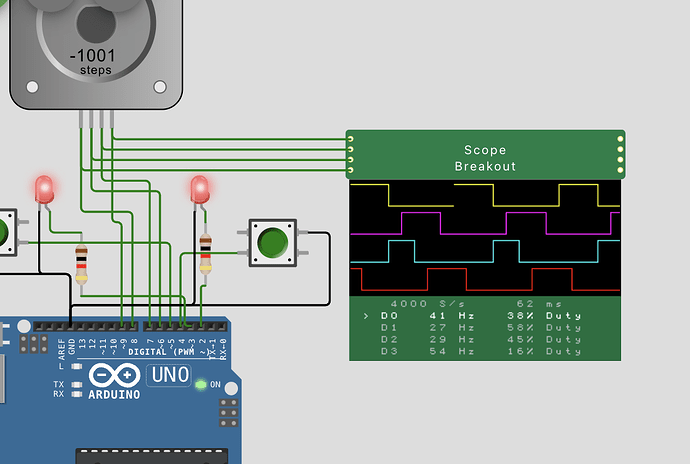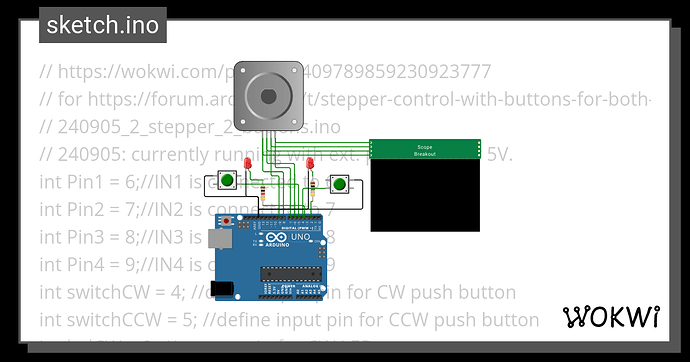Hello,
I am now running the below sketch for my stepper motors to run back and forth. One switch to move CW, the other to move CCW. I want to limit the movement of the stepper now to 90° by a push of the switch. I have problems to identify where to add a loop and which one best. Can anybody help me modify below sketch ? Many thanks.
// 240905_2_stepper_2_buttons.ino
// 240905: currently running with ext. power supply 5V.
int Pin1 = 6;//IN1 is connected to 6
int Pin2 = 7;//IN2 is connected to 7
int Pin3 = 8;//IN3 is connected to 8
int Pin4 = 9;//IN4 is connected to 9
int switchCW =4;//define input pin for CW push button
int switchCCW =5;//define input pin for CCW push button
int ledCW = 2; // output pin for CW LED
int ledCCW = 3; // output pin for CCW LED
int pole1[] ={0,0,0,0, 0,1,1,1, 0};//pole1, 8 step values
int pole2[] ={0,0,0,1, 1,1,0,0, 0};//pole2, 8 step values
int pole3[] ={0,1,1,1, 0,0,0,0, 0};//pole3, 8 step values
int pole4[] ={1,1,0,0, 0,0,0,1, 0};//pole4, 8 step values
int poleStep = 0;
int dirStatus = 3;// stores direction status 3= stop (do not change)
void setup()
{
pinMode(Pin1, OUTPUT);//define pin for ULN2003 in1
pinMode(Pin2, OUTPUT);//define pin for ULN2003 in2
pinMode(Pin3, OUTPUT);//define pin for ULN2003 in3
pinMode(Pin4, OUTPUT);//define pin for ULN2003 in4
pinMode(switchCW,INPUT_PULLUP);
pinMode(switchCCW,INPUT_PULLUP);
pinMode(ledCW, OUTPUT);
pinMode(ledCCW, OUTPUT);
}
void loop()
{
if(digitalRead(switchCCW) == LOW)
{
dirStatus =1;
}else if(digitalRead(switchCW) == LOW)
{
dirStatus = 2;
}else
{
dirStatus =3;
}
if(dirStatus ==1){ // Forward
digitalWrite(ledCW, HIGH);
poleStep++;
driveStepper(poleStep);
}else if(dirStatus ==2){ // Reverse
digitalWrite(ledCCW, HIGH);
poleStep--;
driveStepper(poleStep);
}else{
driveStepper(8);
}
if(poleStep>7){
poleStep=0;
}
if(poleStep<0){
poleStep=7;
}
delay(3);
}// loop
/*
- @brief sends signal to the motor
- @param "c" is integer representing the pole of motor
- @return does not return anything
*/
void driveStepper(int c)
{
digitalWrite(Pin1, pole1[c]);
digitalWrite(Pin2, pole2[c]);
digitalWrite(Pin3, pole3[c]);
digitalWrite(Pin4, pole4[c]);
}//driveStepper end here


